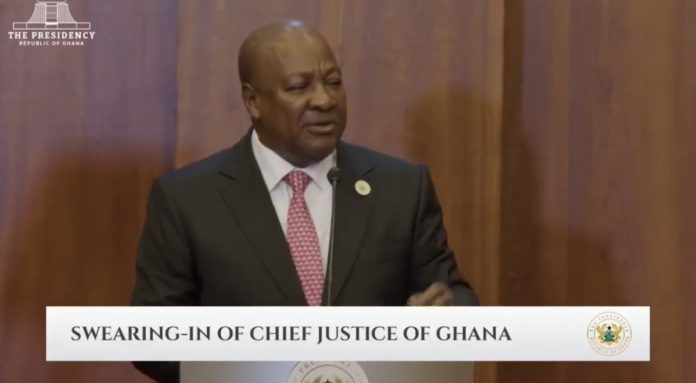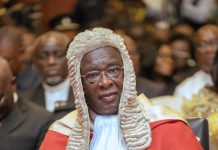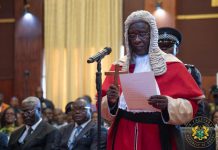President John Dramani Mahama has charged newly sworn-in Chief Justice Paul Baffoe-Bonnie to urgently address the long-standing delays that plague Ghana’s justice delivery system.
“I therefore urge you, my Lord, in collaboration with the Judicial Council and the Bar, to prioritize the reduction of case backlogs,” the President stated after administering the oath of office.
Mahama said many Ghanaians continue to experience justice as distant, slow and financially burdensome. He pointed to frequent adjournments, delayed judgments and complex procedures as major sources of public frustration. Justice, he stressed, must be “accessible,” “timely” and “affordable” for all.
To improve efficiency, the President called for the adoption of innovative case-management systems, expansion and modernization of court infrastructure, especially in underserved districts, and broader use of technology. His proposals included e-filing, virtual hearings where appropriate, and digital recordings to speed up courtroom processes.
He further urged the simplification of procedures, particularly for small claims, family matters, juvenile issues and labour cases, to prevent ordinary citizens from being excluded by technicalities. Mahama pledged that government would provide adequate resources to support these reforms, emphasizing that the judiciary must be equipped to deliver justice “in a modern and efficient manner.”
The President highlighted the Constitutional role of the courts as the last refuge for vulnerable groups—including the poor, marginalized, persons with disabilities and children.
He called for strengthening specialized courts and divisions to address issues such as family welfare, land disputes, environmental protection, commercial transactions and corruption.
Mahama also encouraged the promotion of alternative dispute resolution to ease pressure on formal courts, particularly in community and family disputes. He cautioned that justice must not exist only in law books but must be “seen, felt, and experienced in the daily lives of our people.”
He underscored the need for continuous learning and capacity building for judges due to emerging areas of law, urging the strengthening of the Judicial Training Institute and the development of clear performance standards without compromising judicial independence.
The President stressed the importance of cooperation between all three branches of government, explaining that the judiciary requires an enabling legal framework, adequate budgetary allocation and supportive policies.
He affirmed the readiness of his administration to work with the judiciary in a manner that preserves its independence.
Mahama concluded by urging citizens to trust national institutions and resolve disputes peacefully, while the judiciary works to meet rising public expectations for timely and impartial justice.









